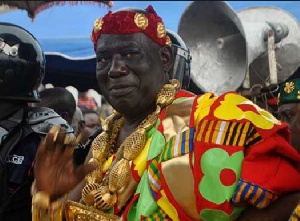The Omanhene of the Oguaa Traditional Area, Osabarima Kwesi Atta II, has commended the National Development Planning Commission (NDPC) for the nationwide consultations it is holding for Ghanaians to play an active role in the preparation of a long-term national development plan.
He said the involvement of citizens and political party representatives from the beginning of the process would enable them to own and protect the eventual plan. Political party manifestos, going forward, should in future be tailored to the overall national plan for consistency in development, he suggested, adding that Ghanaians would hold governments accountable should they stray from the plan. However, the plan should also be made flexible to allow for changes when the need arises.
Osabarima Kwesi Atta II was addressing an NDPC team that called on him ahead of the Central Region consultative forum held on 16-17 November, 2015 in Cape Coast. The forum was the eighth regional consultation.
Speaking at the forum on behalf of the Central Regional House of Chiefs, the Omanhen declared their support for the process, adding that "such a plan for Ghana should have been developed about 20 years ago".
The Central Regional Minister, Mr. Aquinas Tawiah Quansah, said that "evidence around the world shows that countries that have achieved spectacular successes in development and high growth did that through consistent long-term plans," and therefore commended the NDPC for spearheading this all-important national assignment.
According to the Minister, development planning is not new to Ghana, however, he suggested that the plan, when completed, should be entrenched in the Constitution so it becomes binding on any political party that assumes office. He said successive plans have not been fully implemented due to political instability and the tendency of new governments to abandon the plans of their predecessors.
He called on all Ghanaians to dispel any feeling of hopelessness and cynicism as far as our development is concerned, but rather be inspired by the "patriotism and sense of purpose that energised our forefathers to forge the legacy that we have inherited and build on them".
According to the Director-General of NDPC, Dr. Nii Moi Thompson, the persistent nature of some of Ghana's problems in the area of education, sanitation, corruption and other social vices is "a reflection of a lack of a long-term thinking". He quoted a newspaper headline from 1968 that said "Poor sanitation threatens lives in Accra", and pointed out that the situation persists not just in Accra but in other major cities around the country.
Dr. Thompson noted that "the future that we desire to have will not by itself take place, we have to craft, sculpt it, dream it, plan it and live it". No country has been able to develop itself by "deliberately and systematically depriving its citizens the opportunity to improve themselves," he warned.
"We often talk about adding value to raw materials but we fail to think of adding value to our human resources. It is the ultimate resource and yet because of the lack of proper planning, we have failed to do precisely that," he said, adding that this is what has prompted the need to take a long-term view of our development.
According to him, large numbers of students who make it to secondary school do not get admission into tertiary institutions, a situation which can be attributed to failed and visionless educational policies. Stressing the importance of long-term planning, he pointed out that "no political party can develop the infrastructure we need nationwide within four, eight or even 12 years." We need a non-partisan long-term view.
Participants at the forum included officials from decentralised ministries, departments and agencies; civil society organisations; students; chiefs from the Central Region and the six main political parties: Convention People's Party, Great Consolidated Popular Party, National Democratic Congress, New Patriotic Party, People's National Convention and Progressive People's Party.
After the opening session, groups were formed to exchange ideas for inputs into the long-term national development plan. They discussed five broad themes: social development; economic development; environmental development; institutional development/governance; and Ghana and the international community.
NDPC organised another forum on the University of Cape Coast campus for students to share their aspirations, dreams and vision of Ghana's development agenda for the next forty years.
Regional News of Friday, 20 November 2015
Source: NDPC













